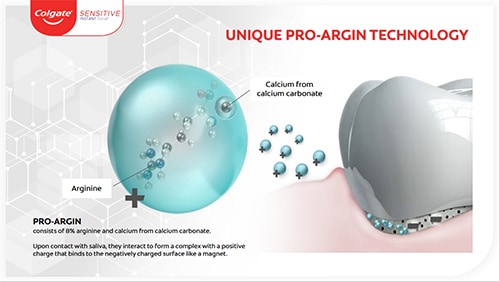Dentine hypersensitivity is a common problem, affecting the quality of life and oral health of millions worldwide. While there are plenty of anti-sensitivity toothpastes available, they are not all created equal. Here, we discuss how innovative technology can help you provide your patients with effective, rapid and long-lasting relief from dentine hypersensitivity.
What is dentine hypersensitivity?
Dentin hypersensitivity is characterised by a short, sharp pain arising from exposed dentine with open dentin tubules, occurs in response to external stimuli, and cannot be attributed to any other dental defect or disease. These stimuli include:
Thermal, e.g. hot or cold foods and drinks.
Tactile
Evaporative, e.g. air blasts.
Osmotic, e.g. sweetness of sugars.
Chemical, e.g. intrinsic or extrinsic acids.
There are numerous theories about why dentine hypersensitivity occurs, but the most widely accepted is Brannström’s hydrodynamic theory. This theory proposes that when dentine is exposed and the protective smear layer is compromised, stimuli are able to influence the movement of fluid in the dentinal tubules. The movement is thought to stimulate pulpal nerve endings, causing the characteristic short, sharp pain.
How dentine hypersensitivity affects your patients
Dentine hypersensitivity can seriously impact a patient’s quality of life. Patients report avoiding their favourite foods and drinks because they trigger pain, and some say that the pain causes them anxiety or embarrassment in social settings that involve eating and drinking.
Hypersensitivity can make daily oral hygiene an uncomfortable experience. Patients may find it difficult to brush to an adequate standard and may avoid activities like interdental cleaning or rinsing, putting them at risk of further oral health problems. When they do seek dental treatment, sensitivity can lead to a painful and stressful visit, causing some patients to avoid the dentist altogether.
Despite the impact, many patients don’t report their symptoms. They often see sensitivity as a fact of life or a consequence of age, and may not even realise that solutions are available. They simply adapt their behaviour and tolerate the pain until it becomes unbearable.
Not only can you offer your patients an effective dentine hypersensitivity solution, but they may be pleasantly surprised to know that this comes in the form of a desensitising toothpaste.
Pro-Argin technology
Ideally, a toothpaste used to manage dentine hypersensitivity is easy to use, causes no irritation, and offers rapid, lasting relief. With patented Pro-Argin technology, Colgate Sensitive Instant Relief Toothpaste achieves these goals using patented Pro-Argin technology that uses an 8% arginine and calcium carbonate formulation to mimic the natural mechanisms that protect against hypersensitivity. On contact with saliva, it forms a positively charged complex that binds to the negatively charged dentine surface like a magnet, creating a calcium-rich layer that occludes the open tubules. This prevents fluid movement and nerve stimulation, and in covering the exposed dentine a protective, acid-resistant layer is formed.
Effective, immediate and long-lasting relief
Colgate Sensitive Instant Relief Toothpaste with Pro-Argin Technology has demonstrated superior dentine occlusion when compared to a desensitising toothpaste containing stannous fluoride or calcium sodium phosphosilicate as the desensitising agent. In a laboratory study, it was found to achieve 91% tubule occlusion, compared to 67% tubule occlusion for a stannous fluoride toothpaste. In another study, it achieved 88% tubule occlusion compared to 50% for a calcium sodium phosphosilicate toothpaste. The desensitising effect is immediate, giving your patients fast relief from sensitivity pain.
In two double-blind randomised clinical studies by Nathoo et al. and Ayad et al., Colgate Sensitive Instant Relief was compared to a 2% potassium ion toothpaste. Both studies found that a single application of Colgate Sensitive Instant Relief provided significant immediate relief compared to the 2% potassium ion toothpaste.
The relief from sensitivity is proven to be long-lasting, with arginine and calcium carbonate barrier remaining intact and resistant to acid attacks with ongoing use of Colgate Sensitive Instant Relief. Docimo et al. compared the Pro-Argin toothpaste to a 2% potassium toothpaste and found a significantly greater reduction in sensitivity in the Pro-Argin group, maintained over eight weeks.
When it comes to relieving the pain of dentine hypersensitivity, technology clearly matters. When you recommend Pro-Argin technology to your patients, you can do so with full confidence that you're offering a clinically proven, effective solution.


Was this article helpful?
If you’d like a response, Contact Us.